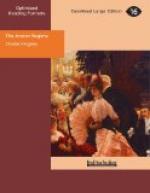And so with the rest of the philosophes. That there were charlatans among them, vain men, pretentious men, profligate men, selfish, self-seeking, and hypocritical men, who doubts? Among what class of men were there not such in those evil days? In what class of men are there not such now, in spite of all social and moral improvement? But nothing but the conviction, among the average, that they were in the right—that they were fighting a battle for which it was worth while to dare, and if need be to suffer, could have enabled them to defy what was then public opinion, backed by overwhelming physical force.
Their intellectual defects are patent. No one can deny that their inductions were hasty and partial: but then they were inductions as opposed to the dull pedantry of the schools, which rested on tradition only half believed, or pretended to be believed. No one can deny that their theories were too general and abstract; but then they were theories as opposed to the no-theory of the Ancien Regime, which was, “Let us eat and drink, for to-morrow we die.”
Theories—principles—by them if men do not live, by them men are, at least, stirred into life, at the sight of something more noble than themselves. Only by great ideas, right or wrong, could such a world as that which Le Sage painted, be roused out of its slough of foul self-satisfaction, and equally foul self-discontent.
For mankind is ruled and guided, in the long run, not by practical considerations, not by self-interest, not by compromises; but by theories and principles, and those of the most abstruse, delicate, supernatural, and literally unspeakable kind; which, whether they be according to reason or not, are so little according to logic—that is, to speakable reason—that they cannot be put into speech. Men act, whether singly or in masses, by impulses and instincts for which they give reasons quite incompetent, often quite irrelevant; but which they have caught from each other, as they catch fever or small-pox; as unconsciously, and yet as practically and potently; just as the nineteenth century has caught from the philosophers of the eighteenth most practical rules of conduct, without even (in most cases) having read a word of their works.
And what has this century caught from these philosophers? One rule it has learnt, and that a most practical one—to appeal in all cases, as much as possible, to “Reason and the Laws of Nature.” That, at least, the philosophers tried to do. Often they failed. Their conceptions of reason and of the laws of nature being often incorrect, they appealed to unreason and to laws which were not those of nature. “The fixed idea of them all was,” says M. de Tocqueville, “to substitute simple and elementary rules, deduced from reason and natural law, for the complicated traditional customs which governed the society of their time.” They were often rash, hasty, in the application of




